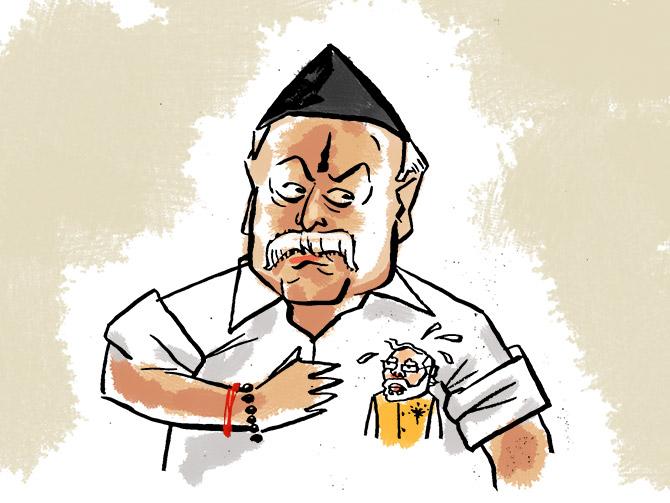'By holding forth on Swadeshi economics, Bhagwat is showing his intent to fight back,' says Shekhar Gupta.
Illustration: Dominic Xavier/Rediff.com

The Sarsanghchalak, as the Rashtriya Swayamsewak Sangh calls its chief, makes his equivalent of the State of the Union address on Dussehra at the organisation's headquarters in Nagpur.
It always makes some news, but more so now that the BJP is in power, in its second term, with a bigger majority than in the first.
Also, when this government is delivering what are considered the RSS's 'core concerns': Scrapping of Article 370 in Kashmir, the Uniform Civil Code and the Ram Mandir in Ayodhya.
Chief for a decade now, Mohan Bhagwat made more news than usual this year because he waded into the issue of lynching and his definition of who's a Hindu and who's an Indian -- both necessarily synonymous.
His arguments on both issues were contentious and drew much attention, some in criticism and, among his faithful, in appreciation.
In the process, a very significant issue that he dwelt on at great length was missed. That's what we are exploring more critically today.
It will be useful if you listened to just some parts of that 63-minute speech again -- just the first minute, and then about 14 minutes from 28:00 to 42:00, laying out his economic philosophy.
The key lies in what comes in the very introductory seconds. He begins by mentioning the important anniversaries of two most eminent and venerated Indians -- Guru Nanak Dev (550th anniversary) and Mahatma Gandhi (150th).
I do not believe many outside the RSS-BJP ecosystem, or those who follow and study Indian politics closely, would be so familiar with the third -- Dattopant Thengadi -- whose centenary year, he noted, would begin soon (November 10).
That name may not ring a bell. And certainly, he wasn't somebody in the same league as Guru Nanak and Gandhi for anyone, not even the RSS. But he was important enough to find a mention alongside the other two.
That it was no insignificant platitude or a passing flourish becomes evident once you hear the second part of those 14 minutes carefully.
Born in Wardha, not far from Nagpur, in 1920, Thengadi was one of the modern (post-Independence) founding fathers (it isn't politically incorrect to use that here) of the RSS and the ideology of its political offspring in both its avatars, the Bharatiya Jana Sangh and Bharatiya Janata Party now.
His area of interest was the economy. His thought has defined the economic worldview of the RSS more than any other, especially in the past 30 years, or generally when India began opening up its economy.
Thengadi was a fellow traveller of Atal Bihari Vajpayee. Both formed the Bharatiya Mazdoor Sangh, the labour arm of the RSS, together in Bhopal in 1955.
They also fought bitterly and unforgivingly during the six years of the Vajpayee government.
On the economy, Thengadi was the biggest thorn in his side, opposing all his decisions, especially the privatisation of public sector undertakings, reduction in import tariffs, and opening up to foreign direct investment.
At one point, he demanded the head of Yashwant Sinha, then leading the reform push as finance minister. Vajpayee resisted for a year, but eventually gave in.
Thengadi had real power within the sangathan (organisation) as BJP/RSS people often describe themselves collectively.
He also detested Arun Shourie.
He likely celebrated when a Supreme Court judgment ruled that it was mandatory to seek a parliamentary vote before selling any PSU. It stopped Mr Shourie in his tracks.
Important to note in today's context that this happened exactly when the Vajpayee government had put the two big oil-marketing companies -- Hindustan Petroleum Corporation and Bharat Petroleum Corporation -- on the block.
Thengadi's wasn't a lone voice. His first child, BMS, protested against the Vajpayee reform era, often louder than the Left and the Congress-affiliated Indian National Trade Union Congress, and grew in strength.
Meanwhile, he had formed two more powerful pressure groups: The Bharatiya Kisan Sangh in 1979 for farmers, and the Swadeshi Jagaran Manch -- which we are all more familiar with today -- in 1991. Remember that year, 1991? When the big Narasimha Rao-Manmohan Singh reform was launched?
The SJM subsequently built a national voice and stature by opposing globalisation of trade, beginning with what was called the Dunkel Draft.
K N Govindacharya, then the customary RSS man in the BJP as general secretary, was its most prominent spokesman.
By the end of Vajpayee's tenure, the relationship between the two had deteriorated visibly. Often, when a modern new idea was mentioned, Vajpayee would say with a smirk something like 'arrey bhai, Thengadiji ko kaun sambhalega? (who will manage Thengadi?)'
In spite of that bitter fight Vajpayee cleared Bt cotton seeds.
In 16 years under Manmohan Singh and Narendra Modi, not one new seed has been cleared.
The fight ended in 2004. In May, Vajpayee lost power. Later that year, on October 14, Thengadi passed away. Probably with the satisfaction that the new UPA government, controlled by the Left, had dumped privatisation forthwith and launched a flurry of welfare schemes of just the kind he would have wanted.
Now that we know more about Thengadi, whom the Sarsanghchalak listed among eminences like Guru Nanak Dev and Mahatma Gandhi, we can translate the 14 minutes on the economy in his annual sermon better.
Quick summary:
- There's an economic crisis, but don't make too much of it.
- Why paint the devil on the wall?
- GDP isn't the only measure of growth.
- Crack down on corruption, but don't victimise the innocent.
- We believe in Swadeshi, but that doesn't mean we say isolate yourselves.
- Trade is global, but we should buy only what we cannot make and need.
- Why import even cow semen from a Brazilian hybrid developed with an Indian native?
- Use Swadeshi.
He then talks about how exports are good, imports are bad, the RSS principle of frugality, buying only what you must, protecting what you make from competition, and so on.
Some of it isn't exact translation but my faithful interpretation. Then he comes to FDI.
Again, paraphrased: Foreigners can invest, but learn from countries that insist on one domestic board member with veto rights. So, foreigners own the shares but power is with our government.
On the other hand, see what's happening. Our (new) companies are seen to be owned and run by Indians, but once you look deeper, shareholding is with the Chinese.
This is classical Thengadinomics.
It also runs contrary to many of the recent moves and promises of the Modi government as it battles India's gravest economic downturn since 2008.
It is opening more areas to FDI, negotiating new trade arrangements, especially with America, and the Regional Comprehensive Economic Partnership closer to the region.
It has also announced massive privatisation as the mood-lifter for the economy and a plasma transfusion for the fisc.
Both trade deals and PSU sales are being opposed by the SJM, as are new agricultural, especially seed technologies.
On each front, the Modi government has made moves in the opposite direction: What would make Vajpayee smile and Thengadi frown.
You know what, the biggest PSU put on the block now, BPCL, is exactly what Vajpayee had been thwarted from selling in 2003.
We can also see it isn't something Modi thought of just now. Buried in the 187 obsolete laws repealed in a 2016 mass-cull was also the 1976 Act passed under Indira Gandhi to nationalise MNC Burmah Shell and rename it BPCL.
We can't say as yet if, by holding forth on Swadeshi economics in such detail, Bhagwat is showing his intent to fight back again.
It is unlikely, given the power differential between Vajpayee and the current prime minister. But not impossible.
Our hope: An ideology has yet to be discovered which might even believe that the best way to get out of a hole, especially of the kind India's economy has fallen into, is to keep digging deeper.
By special arrangement with The Print











